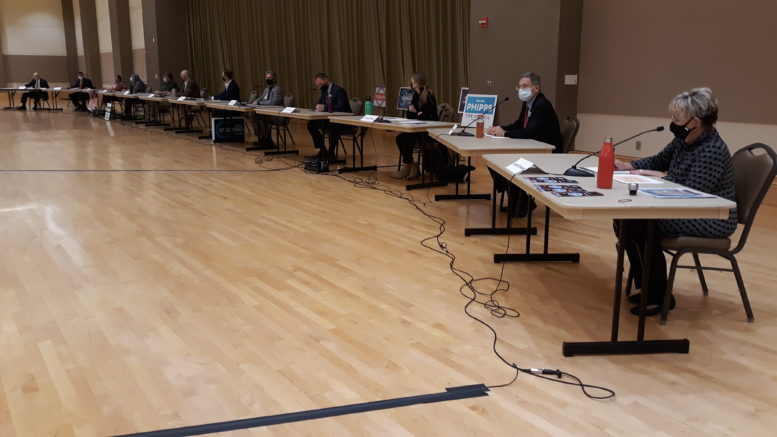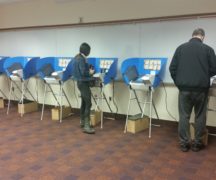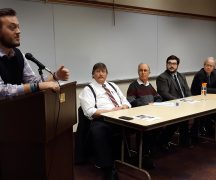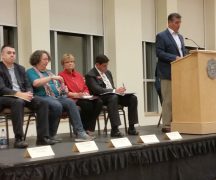By JAN LARSON McLAUGHLIN
BG Independent News
Bowling Green City Council candidates expressed a wide range of support and scorn for topics covered at the League of Women Voters Candidates Forum Sunday evening.
Some cited city ordinances, one cited Scripture. Some talked about efforts to help businesses, and others said those same efforts likely harm businesses. Some talked about revitalization of the downtown, while one called it a “cesspool” for “thugs” on weekends.
For two hours, the candidates for Bowling Green City Council and Bowling Green Board of Education answered questions and told voters who they are and what they stand for. This story will address the council candidates. A story on the school board candidates will be posted Monday.
Bowling Green voters will see three contested races for ward council seats, and three uncontested races for at-large seats and for the Second Ward seat. One of the at-large candidates, Greg Robinette, was not present at the forum.
Anyone wanting to view the entire candidate forum may go www.lwvbg.org.
Following are brief descriptions of the candidates present.
Mark Hollenbaugh, a Democrat, is an unopposed candidate for an at-large council seat. He currently represents the First Ward and serves as council president. A high school American history teacher, Hollenbaugh has served on the city planning commission, charter review committee, and on the historic prevention commission.
“I spend most of my time listening,” he said. “I keep my mouth shut and my ears open.”
Mark Hanson, a Republican, is running for the First Ward council seat. Hanson recently retired after serving as an officer with the Bowling Green Police Division for more than 25 years. His Christian faith is the foundation of his life.
His priority is keeping BG safe. He vowed to work against anti-police rhetoric, and make sure the police division is fully funded. He also wants to streamline the process of reporting BGSU students who cause consistent problems for full-time city residents. “Then BGSU needs to kick them out of school,” he said.
Nick Rubando, a Democrat, is also running for the First Ward council seat. He works for the Toledo Metroparks, and has experience in community organizing and environmental justice.
He believes fair housing is a human right, and that real meaningful change starts at the grassroots level.
Joel O’Dorisio, a Democrat, is running unopposed for the Second Ward council seat. He is an educator, entrepreneur and union organizer, who believes government should advocate for public good.
“I’d like to give back to the community,” he said.
Tony Hunter, a Republican, is running for the Third Ward council seat. He first came to BGSU to play football, and is employed as a finance manager. He works with the high school ministry at his church.
He is not a fan of divisive politics. “Here in Bowling Green, we can focus on policies that actually work and help our citizens,” he said.
Hunter said City Council needs a shift, adding that members need to be careful about going beyond what local government can do effectively.
Rachel Phipps, a Democrat, is also running for the Third Ward council seat as an incumbent. She is an attorney, who has experience working on the city’s charter review, and who now serves as chair of council’s planning, zoning and economic development committee.
She has worked on the city’s historic preservation effort, its climate action plan, and programs that helped businesses get through the pandemic.
Bill Herald, a Republican, is running for the Fourth Ward council seat. He has served on council 12 years over four decades. A data scientist at First Solar, he has attended more than 1,000 city-related meetings, including his own quarterly ward meetings. He has knocked on more than 2,000 doors this year.
He prides himself in being a responsive liaison between citizens and city government.
Sandy Rowland, a Democrat, is also running for the Fourth Ward seat. She has served 10 years on council, currently in an at-large seat. She is a Realtor, and serves as chair of council’s park and recreation committee.
“I love solving problems for residents,” she said.
The first question posed to the council candidates covered rental housing inspections, asking if they supported self-inspections by landlords or independent inspections.
AT – LARGE
Hollenbaugh said the comprehensive rental housing inspection proposal allows the city to order deficiencies be corrected – without putting the city in legal jeopardy. The legislation under consideration will “do the most good with the least amount of harm,” he said.
FIRST WARD
Hanson said he opposes unnecessary and costly regulations for rental housing that will likely be passed on to tenants. “We need to keep the costs of rentals down,” he said. Hanson is also against a city rental registration fee that will be more burdensome to tenants.
The city already has ample information on its website for renters who are experiencing difficulty with their housing, Hanson said.
Rubando said the rental registration fee would only cost $3 per month. Though he believes most landlords in Bowling Green are trying to do a good job, some are not. “The burden shouldn’t fall on the renter” to fix problems, he said.
“This issue is very close to my heart,” said Rubando, who rented an apartment with no windows as a college student here. “My landlord knew I had no options.”
SECOND WARD
O’Dorisio said the protest about rental registration fees is a “strawman argument.” “They’ve already passed that cost on to the tenants,” he said.
Safe housing is an equity issue, he said, voicing support for mandatory independent inspections of rental units. The city, O’Dorisio said, has a responsibility to make sure rental housing is safe.
THIRD WARD
Hunter said he opposes inspections of rental units. With his background in investments, he knows that such regulations can “really smother local businesses really quickly.”
Hunter said City Council has not demonstrated that inspections are a solution for unsafe rental units. Inspections would be a burden on landlords and “I don’t think it would actually solve the problems.”
Phipps stressed that with more than half of the homes in Bowling Green being rental units, the city needs to ensure they are safe with the rental registration and inspections. The proposed legislation would educate tenants of their rights, and ultimately preserve property values in the city.
The city listened to more than 200 tenants, many landlords and citizens before introducing the ordinance, she said.
FOURTH WARD
Herald was one of the City Council committee members to hold public meetings on the rental housing legislation. The “measured” approach decided upon includes self-inspections by landlords and an audit procedure to verify the results, he said.
Rowland said citizens have been asking for a reporting mechanism for unsafe rental homes for 40 years. The new legislation would include independent inspections if a tenant reports that the self-inspection was not accurate.
The second question asked the candidates to describe incentives that the city could provide to attract new businesses.
FOURTH WARD
Rowland said the city already offers perks like low electric rates, quality water, and a good location. But it is missing reasonably priced housing for new residents.
“We lack living space for people who want to live and work here,” she said.
Rowland suggested the city look into programs reducing tax rates on builders constructing new homes.
Herald reflected on a time when city leaders questioned whether or not Bowling Green should continue to grow. But it was decided, “if we don’t strive to grow properly, we will slide backward.”
Herald pointed out the existing organizations engaged in attracting businesses to the city.
THIRD WARD
Phipps pointed out the city’s efforts to help keep a vibrant downtown, support locally-owned businesses, and apply a people-first strategy on East Wooster Street. “We should certainly build on those efforts,” she said.
However, the city is operating on an economic development plan from the late 1990s, which focuses primarily on manufacturing businesses. Phipps is looking for more “creative solutions.”
Hunter said he views local government as a tool to provide incentives and an environment in which businesses can thrive. And he views the city as its own small business, which should thrive on its own means.
SECOND WARD
O’Dorisio said manufacturing is in the middle of transition, and Bowling Green needs to respond appropriately. “The economy is changing. We have to make sure the city is keeping up with that,” he said.
“We need to make sure we are looking ahead and not fighting last century’s battles,” he said.
FIRST WARD
Rubando said sustainability measures are key to attracting new economic development. He suggested the city invest in a new training facility for the fire division. That would give the community one of the highest insurance scores, which would allow businesses and residents to pay lower rates, he said.
Hanson said the city needs to not stand in the way of new businesses. He referred to the city missing out on a Best Buy warehouse many years ago. “City Council refused to rezone the land.” He also said if the city approves a zero carbon plan, that would increase utility costs. Such a step would make BG look unappealing to new business, and “could send the ones here packing.”
Hanson also stressed that the city does not need more bars.
“The city is over-dependent on the alcohol-business trade,” he said.
And he said the downtown area has turned into a “thugs” playground on the weekends. “It’s a dangerous cesspool of mayhem,” Hanson said. “We need to find a way to clean things up.”
AT-LARGE
Hollenbaugh said while he isn’t an expert on economic development, the city does employ such experts. “I listen to them,” he said.
“City Council realizes we need to update our vision of economic development,” he said.
The next question dealt with the candidates’ commitment to reducing greenhouse gases in Bowling Green.
THIRD WARD
Hunter cautioned that the city must be careful to not create higher utility rates, adopt policies that are not effective, or step beyond the role of local government.
“We must be very careful,” he said. “Because if we step out of our role of local government, we could do more damage than good.”
Phipps, who drafted the resolution for the city’s sustainability plan, said “we have so much to be proud of here.” One of council’s goals for next year is to study a recycling and composting program for downtown businesses.
Phipps said state and federal government will be looking toward funding sustainability programs. “It’s the responsible forward-looking thing to do,” she said.
SECOND WARD
O’Dorisio said BG has historically been at the front and back of sustainability issues – having the first city wind turbines in the state and entering a long-term contract for a coal-fired power plant.
He advised other candidates to not be afraid of economic harm from switching to clean and sustainable energy. Solar power is currently cheaper than other sources, he said.
“It’s economically advantageous to accelerate our switch,” O’Dorisio said.
AT-LARGE
Hollenbaugh credited the late Neocles Leontis for taking steps to “awaken Bowling Green City Council to our environmental issues.”
“There’s no doubt we need to do more,” Hollenbaugh said.
But he cautioned against moving too rapidly and damaging businesses.
“We need to find a happy balance between sustainability and viability.”
FIRST WARD
Hanson said he is not opposed to green energy, but “I am not a climate change alarmist.”
He does not believe in pushing for more renewable energy, but instead to invest in it when it is more affordable.
“I’m for a low carbon plan, not a no carbon plan,” he said.
Hanson said he would support the waiving of fees for residents with rooftop solar systems that are tied into the city grid.
Rubando said investing in green energy will not drive up energy costs or drive away business. If elected to council, he said he would look at the sustainability effect of every decision made. He said he supports bike lanes, new parks, and expanded recycling.
“Our focus on sustainability is what makes Bowling Green great,” Rubando said.
FOURTH WARD
Rowland pointed out her concern for future generations. “Sustainability is very important to me,” she said.
She listed off the city efforts, including getting 40% of its energy from green sources, having a 165-acre solar field, buying 35% of its power from hydro, planting 7,600 city trees, having 125 acres of nature preserve, working toward a police fleet of hybrid cars, and having a sustainability director.
Herald noted that he was on council when the city started its curbside recycling program. He pushed for a sustainability board, and the creation of a sustainability committee on City Council.
“That will help us get ready for tackling issues in the future,” he said.
Last month, Herald proposed a tax credit for residents with rooftop solar systems.
The final question involved the efforts to make the city’s non-discrimination ordinance more inclusive.
FIRST WARD
Rubando said he grew up in a Catholic home. “When Jesus says love thy neighbor, I take that to mean all my neighbors.” He said Bowling Green needs to work on being inclusive, so all people can be comfortable living here.
He also said he is aware of a study that reportedly shows people of color being more likely to be stopped by Bowling Green Police.
Hanson said the Bible teaches that sex should be between one woman and one man, and that people who engage in such acts as homosexuality, thieving and adultery are sinners. He said he has adopted a mission of reaching sinners through repentance.
Hanson also assured that BG Police Division is not targeting people of color.
FOURTH WARD
Rowland talked about her role on the city’s Human Relations Commission, which focused on equal treatment for all city residents. A dozen years ago, the four pieces of the city’s anti-discrimination ordinances were challenged and placed on the ballot – where citizens supported all four measures, she said.
Rowland has been a supporter of LaConexion, helped BRAVE get started, and serves on the welcoming community program.
“We want to be welcoming, no matter your color or country you came from,” she said.
Herald said City Council needs to set an example for the community. He pointed out the community organizations that help council with anti-discrimination efforts, such as the Human Relations Commission and Not In Our Town, whose meetings he regularly attends.
“We as council need to set an example,” he said.
THIRD WARD
Hunter said it’s important to support and not divide the community. “This community has always been welcoming,” he said.
Hunter talked about his football team “family,” which still gets together occasionally.
“I just think this is one of those issues. It’s a hard subject for everyone involved,” he said.
Phipps noted the addition of three more protected classes to the city’s anti-discrimination ordinance.
“We must absolutely stay vigilant here,” she said. “Instances of hate and racism must never be ignored.”
AT LARGE
Hollenbaugh said as a straight white male, he realizes he doesn’t face the daily challenges that many others encounter.
“I don’t walk in the same world as other members of our community,” he said.
So he listens to individuals or organizations that have experiences he doesn’t. Hollenbaugh said he worked hard to put the changes suggested by LaConexion in the updated anti-disrimination ordinance.
“I am open and willing to make changes as necessary.”
SECOND WARD
O’Dorisio said the city has a responsibility to make sure the community is safe for all.
“Talking about an inclusive community is different than having an inclusive community,” he said. “We have an obligation to make sure we welcome everyone.”





